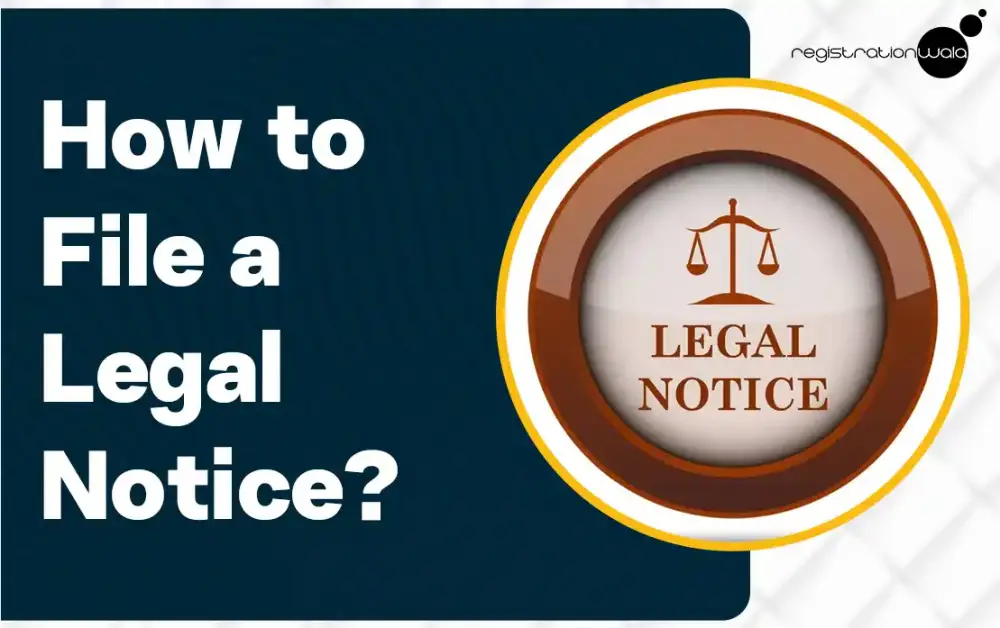Know Legal Notice meaning , types and How to file it
- September 07, 2024
- Registrationwala

- Home
- /
- Knowledge Base
- /
- News & other businesses
- /
- Blog
- /
- Know Legal Notice meaning , types and How to file it
Know Legal Notice meaning , types and How to file it
Legally speaking, written words hold more value than oral words. This is because written documents can be kept as a record easily. Written documents are often useful at the time of legal disputes. They serve as important evidence to support your case. Legal Notice is an important document which serves as evidence that you tried solving the matter before approaching the court/dispute resolution authority for help. If you want to find out how to file a legal notice, check out this article.
What is a Legal Notice?
Legal notice is a written document that is filed on certain legal terms and conditions, due to which a person gets legally bound to acknowledge it. This document can be drafted against complaints of personal/private matters. You can file a legal notice against an employer/employee, for seeking divorce from spouse, for defamation, harassment at work, etc.
Generally, a legal notice is the first step to solve a matter before approaching the court of law. Many times, the matter gets resolved by merely sending a legal notice, and one does not have to approach the court for further help. (However, this isn’t always the case.)
Types of Legal Notice
There are various types of legal notices based on different purposes:
-
Legal Notice for Cheque Bounce
-
Legal Notice for Eviction of Tenant
-
Cease and Desist Legal Notice
-
Demand Legal Notice
-
Legal Notice for Recovery of Dues
-
Divorce Legal Notice
-
Trademark Infringement Legal Notice
-
Legal Notice for Defamation
-
Legal Notice for Harassment
-
Legal Notice for Trespass
-
Legal Notice for Product Liability in Consumer Matters
-
Legal Notice for Breach of Contract
-
Legal Notice for Wrongful Termination
How can you file a Legal Notice?
As mentioned above, there are many types of legal notices. There isn’t one particular format in which a legal notice must be filed. However, there are a few things that every legal notice must contain, such as the legal notice sender’s version of the events that resulted in incident, details and description of the incident, the law the sender relies on for claiming remedy before the court/dispute resolution authority and conveyance of sender’s intention to bring lawful action against the legal notice recipient.
Additionally, the legal notice may also contain allotment of time to the recipient to respond to the legal notice in the manner prescribed by the sender. Make sure the legal notice doesn’t miss out any important information, and is written in a clear and easy-to-understand manner.
You can file a legal notice on your own. However, it is recommended that you consult with an experienced advocate who knows which legal notice would be appropriate for you. If you choose to get a legal notice sent on your behalf by an advocate, the legal notice will be typed on their firm’s letterhead, and hence, the legal notice might seem intimidating and be taken more seriously by the recipient. Moreover, an advocate can guide you regarding the next step to be taken if the issue isn’t resolved through the notice. You can send the legal notice by post, and also by email. Many people prefer to do both.
Is Police Complaint Required Before Sending Legal Notice?
Police complaints are generally done in case of criminal offense cases where the FIR is required to be lodged on an immediate basis. FIR should be lodged in case of criminal offence cases like theft, cybercrime, rape, murder, etc. where the culprit should not be given any warning but direct punishment for the crime they’ve committed.
In case of a legal notice, you’re basically providing the recipient with a warning and a chance to fix their wrongdoings and sort out the matter. By sending this document, you make the recipient aware of the legal consequences they can face if they don’t solve the matter.
In case of civil cases, you must file a legal notice only, not an FIR. Police do not deal in civil cases. This is because they do not have the power and authority to recover money or act as a civil court for recovering money.
Check Legal Notice For Dues Recovery
Conclusion
A legal notice is a crucial document, which serves as evidence in court proceedings. The legal notice must be filed in a clear and precise manner, so that the recipient can understand the point of this document. You can write a legal notice on your own or seek a lawyer’s assistance for drafting this document. An experienced lawyer’s assistance would be helpful as they would know what relevant details are to be added in the notice, and how to make it sound more convincing.
If your issue doesn’t get sorted out even after filing the legal notice, you can ask your lawyer for the next step for resolution, which may include sending another legal notice or approaching the court of law.
- 592 views
